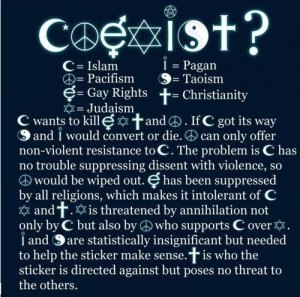“What is Truth?”
That’s the famous last question asked by Pontius Pilate of Truth Himself, the Lord Jesus Christ. (I am the Way, the Truth and the Life.) Immediately after asking this Pilate turned away, indicating he had no interest in an answer. Or perhaps that he didn’t think Jesus had an answer… or even that there was an answer to his question.
In researching Roman culture, I’ve learned they had a very similar more to that which is dominating our post-modern culture these days — a problem discerning or even believing in absolute truth. The honorable Roman felt it was important to be tolerant of other faiths. They would even make altars and offerings to the gods of other faiths (witness the Temple of the Unknown God Paul references in Acts 17), and in return they expected the proponents of those faiths to reciprocate. (The Jews’ continued failure to do so, is pretty much what provoked the Romans to destroy their Temple and Jerusalem and scatter them about the empire in the first and second centuries.)
The problem with tolerating all other faiths, in the sense of making they equally valid or “right”, is that you negate the truth of any of them. And pretty soon you have no truth, as Pontius Pilate expressed.
This thought train was sparked by an article I read today in The Independent on post modernism by Jay Merrick (PoMo: Everybody’s doing it)
Here’s how it starts:
“Forty years ago, we lived “modern” lives. Ideas, emotions and actions seemed ordered, and part of a zeitgeist of confident restraint that originated in the science, mass-production, architecture and art of the 1930s.
“Now we are profoundly immersed in the tortuous, commercially controlled currents of postmodern design and thought, and its weapons of mass psychic deconstruction. Has this made our lives richer in meaning, or just richly vacuous?”
I confess, overall the article was a bit over my head, and much of it centered on the postmodernism of art, architecture, fashion and literature, all of the sort that has never held even the slightest interest for me. Art that takes the most banal of subjects and tries to make something out of them, as if a golf ball is equally as interesting and important subject matter as the material Michelangelo presented in the Sistine Chapel. Fashion chosen to be deliberately ugly, architecture that jabs and slashes or incorporates humongous chairs or concrete suitcases, just because.
As I read his descriptions, it seemed to me almost a deliberate turning away from things that made sense to things that didn’t, from authority on even the smallest of levels. “They” designed socks to be worn on the feet, thus we shall wear them on our heads; “they” say that art should celebrate beauty or drama or truth or the divine… we will make art that celebrates the ugly, the boring, the silly, the profane… It’s an affected, fancy-pants version of “you’re not the boss of me” and I’ll do as I like.
I’m pretty sure that’s what Merrick is saying in this next paragraph…
“Postmodernism duly arose in an uncoordinated blitz of individualistic artistic and intellectual objections to the more or less failed idea of rationalised lives and environments.”
He goes on…
“The novelist Martin Amis warned us that postmodern people “over-existed”. Our postmodern, supposedly self-designed lives are embedded in these modes of over-existence. We’ve accepted the commercial, social and semiotic propellants that have ensured over-consumption in the guise of entertainment. Blizzards of imagery and opinion form a chimera of endless, conflicting possibilities without beginning or end; we seem to crave maximised senses of fractured movement, overlay, ennui and nowness.
“And it’s the hundred times a week we hear, or utter, that most über and craven of postmodern words – whatever.
“Modernism’s either/or mindset has been obliterated by this pervasive whateverness. Few of us now imagine any prospect of lives in which ideas, behaviour and outcomes can be clearly determined. To many, the details of the present must seem increasingly indeterminate or ambiguous; which duly turns our perceptions of the past and the future into cabinets of equally trivial curiosities, rather than illuminating points of perspective.”
<snip>
“The and/but vibe now suffuses almost everything we think and do. Surface has become more important than depth. Style – or, more accurately, stylee – trumps coordinated articulation; disbelief is more acceptable than belief.”
<snip>
“One can’t help fearing that the sheer psychic tonnage of postmodernity’s “undecidable things” is rendering most of us terminally passive and far more interested in ephemera than, say, socio-political ethics, or the implications of Facebook’s plans to calibrate and inter-link the media product preferences of their users…”
If you believe in nothing, if every faith or belief system is equal, then none of them mean anything. How can they? How can you accept the notion that God exists and also that He doesn’t? That He cares, and that He doesn’t. That there is eternal life and there isn’t. That the Bible contains truths we need and yet it doesn’t.
Saying all are equal, brings one down only to one’s own ideas, which are always going to be unstable, since the whole point of this postmodern everything goes is that there’s no absolutes. And an absolute truth is, by definition, stable. Without it, one will be tossed here and there by every wind of false teaching. Whatever sounds good today, whatever works today, whatever I want today, but the result is a life of doubt, and shifting shadows, a life that is “like the surf of the sea, driven and tossed by the wind,” roiling and endlessly rising and falling, going it knows not where.
Like this:
Like Loading...

